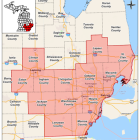
By Donté Smith
The Great Lakes, a vital freshwater expanse for millions, face an ongoing environmental crisis. Beneath the vast waters lies a significant threat: pollution stemming largely from agricultural runoff. This flow of excess nutrients like phosphorus and nitrogen contributes to harmful algal blooms and expanding “dead zones,” jeopardizing ecosystems, water quality and public health across the region. Amidst these challenges, Barn Sanctuary in Chelsea, Michigan, works to make a positive impact on the region. Tom McKernan, sanctuary co-founder and operations director, wants the farm to stand as a living model where animal welfare and ecological stewardship aren’t just compatible, but linked.

By Emilio Perez Ibarguen
In 2020, Lawmakers gathered testimony, sought federal funding and considered creating a task force to combat coastal erosion. Local governments looked to replace outdated zoning rules that let people build too close to the shore. Experts suggested fixes, from incentivizing property owners to move their homes farther inland to banning seawalls that ultimately worsen erosion. But the political will for change seemed to recede with the water. Five years since the height of the crisis — with water levels now 6 inches below average — most Michigan communities still allow home construction perilously close to the shore. Bills aiming to curb construction on coastal dunes or make it easier for homeowners to protect their homes with temporary barriers have failed to gain traction in the Legislature.

By Rachel Lewis
After the great “moose lifts” in the 1980s, researchers were confident Michigan’s moose population would continue to grow, with a projection that the population could reach numbers in the thousands within 15 years. However, since 2010, the DNR has seen the moose population growth stagnate, with population estimates half of what was expected after the reintroduction. This prompted a collaboration among researchers to look into what’s causing the lack of population growth.

By Rachel Lewis
Boxwood shrubs are popular in Michigan because they add greenery in winter months and deer don’t eat them. They had no predators until 2021, when the box tree moth was discovered in New York. Quarantine areas have grown from 11 to 13 counties in Michigan over the last two years.
More Headlines




